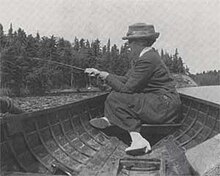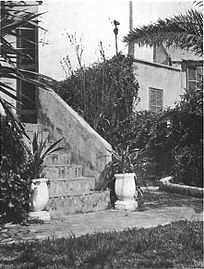| Edith Watson | |
|---|---|
 | |
| Born | Edith Sara Watson (1861-11-05)November 5, 1861 East Windsor Hill, Connecticut, U.S. |
| Died | 1943 (aged 81–82) St. Petersburg, Florida, U.S. |
| Occupation | Photographer |
| Notable work | Romantic Canada (1922) |
| Relatives | Amelia Watson (sister Sereno Watson (uncle) |
Edith Sara Watson (1861 in East Windsor Hill, Connecticut – 1943 in Florida) was a photographer whose career spanned the 1890s through the 1930s. She is best known for her photojournalistic images of everyday life, working people, and women, particularly in Canada.
Early life
Born in 1861 in East Windsor Hill, Connecticut, United States, Edith Watson was the youngest of four children. Her family was involved in the newspaper business and also farmed tobacco. She and her sister, Amelia Watson, shared an interest in the art of watercolor painting, and at one point set out to become working artists by building their own studio. For about a decade, they traveled throughout New England, showing and selling their artwork. In the 1890s, when they went their separate ways, Watson started experimenting with the camera. Watson also studied photography with her uncle, botanist Sereno Watson.
Photography career

In 1896, Watson first traveled to Canada, and spent much of the next 35 years photographing rural people, often women, across the country. She sold her photographs to several North American newspapers and magazines; sometimes, she bartered her photographs to obtain lodging or supplies. Through these efforts, she maintained her independence and supported herself both as an artist and as a traveler.
For many years, she spent time during the winter in Bermuda, renting a cottage in St. George's, Bermuda and selling watercolors and hand-tinted photographs. In 1911, in Bermuda, Watson met journalist Victoria "Queenie" Hayward, who eventually became her partner in work and in life. The two women lived, worked, and traveled extensively together through isolated areas of Canada.
With her camera, Watson documented the lives of people in Newfoundland, Labrador, the Maritimes, Quebec, Ontario, and then westward into Manitoba and British Columbia, while Hayward wrote about them. The two women stayed with First Nations people in Quebec and Ontario; Mennonites, Doukhobors, and other "New Canadians" in Manitoba; and Haida people in British Columbia.
In 1922, Watson and Hayward published Romantic Canada, an illustrated travelogue of their journeys across Canada. The book featured 77 of Watson's photographs reproduced in halftone. It was atypical for its time, as it highlighted women's contributions to rural communities. In it, Hayward coined the phrase "the Canadian mosaic" to describe the region's multiculturalism; the phrase and concept was picked up by subsequent thinkers and artists, including writer and cultural promoter John Murray Gibbon. She sold her work to governments and advertisers, as well as publications including Chatelaine, Maclean's, the Canadian Magazine, National Geographic, and Ladies’ Home Journal. Uncommonly for the time, she insisted on being credited for her published work.
Watson died in St. Petersburg, Florida, in 1943.
Photographs of Canadian women
-
 "A Canadian Gardener at the edge of a Cape Breton village"
"A Canadian Gardener at the edge of a Cape Breton village"
-
 "Along the Shore at Cape Breton Canada"
"Along the Shore at Cape Breton Canada"
-
 "Dried berries being packed away for winter luxuries"
"Dried berries being packed away for winter luxuries"
-
 "Weeding beans on a Dutch truck farm outside Winnipeg, Manitoba"
"Weeding beans on a Dutch truck farm outside Winnipeg, Manitoba"
-
 "Madonna of the Fields"
"Madonna of the Fields"
Photographs of Bermuda
References
- ^ "WATSON, Edith". Canadian Women Artists History Initiative. Concordia University. Retrieved March 1, 2015.
- ^ "S. Watson (1861–1943), Photographer, Connecticut, US". Women from the Outside World. Maritime History Archive. Retrieved March 1, 2015.
- ^ Rooney, Frances (2005). Extraordinary women explorers. Toronto: Second Story Press. pp. 29–37. ISBN 9781896764986. Retrieved March 1, 2015.
- Rooney, Frances (December 31, 1997). "Photographer Edith Watson". section15.ca. Archived from the original on April 2, 2015. Retrieved March 7, 2015.
- Dagg, Anne Innis (2001). The feminine gaze a Canadian compendium of non-fiction women authors and their books, 1836–1945. Waterloo, Ont.: Wilfrid Laurier University Press. p. 129. ISBN 978-0889203556. Retrieved March 1, 2015.
- ^ Bassnett, Sarah; Parsons, Sarah (2023). Photography in Canada, 1839–1989: An Illustrated History. Toronto: Art Canada Institute. ISBN 978-1-4871-0309-5.
{{cite book}}: CS1 maint: multiple names: authors list (link)
External links
Library resources aboutEdith Watson
By Edith Watson
- Romantic Canada, by Victoria Hayward, illustrated with photographs by Edith S. Watson
- Working Light: The Wandering Life of Photographer Edith S. Watson, by Frances Rooney
- "Edith Watson" in Photography in Canada, 1839-1989: An Illustrated History by Sarah Parsons and Sarah Bassnett, published by the Art Canada Institute
- 1861 births
- 1943 deaths
- 19th-century Canadian LGBTQ people
- 19th-century Canadian photographers
- 19th-century Canadian women artists
- 20th-century Canadian LGBTQ people
- 20th-century Canadian photographers
- 20th-century Canadian women artists
- American emigrants to Canada
- Canadian lesbian artists
- Canadian LGBTQ photographers
- Canadian women photographers
- Lesbian photographers
- People from South Windsor, Connecticut
